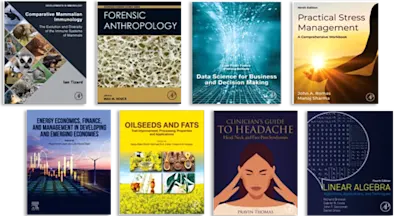
Oceans and Human Health
Risks and Remedies from the Seas
- 1st Edition - April 16, 2008
- Imprint: Academic Press
- Editors: Patrick J. Walsh, Sharon Smith, Lora Fleming, Helena Solo-Gabriele, William H. Gerwick
- Language: English
- Hardback ISBN:9 7 8 - 0 - 1 2 - 3 7 2 5 8 4 - 4
- eBook ISBN:9 7 8 - 0 - 0 8 - 0 8 7 7 8 2 - 2
Oceans and Human Health highlights an unprecedented collaboration of environmental scientists, ecologists and physicians working together on this important new discipline, to the… Read more
Purchase options

Institutional subscription on ScienceDirect
Request a sales quoteOceans and Human Health highlights an unprecedented collaboration of environmental scientists, ecologists and physicians working together on this important new discipline, to the benefit of human health and ocean environmental integrity alike. Oceanography, toxicology, natural products chemistry, environmental microbiology, comparative animal physiology, epidemiology and public health are all long established areas of research in their own right and all contribute data and expertise to an integrated understanding of the ways in which ocean biology and chemistry affect human health for better or worse. This book introduces this topic to researchers and advanced students interested in this emerging field, enabling them to see how their research fits into the broader interactions between the aquatic environment and human health.
- Color illustrations of aquatic life and oceanic phenomena such as hurricanes and algal blooms
- Numerous case studies
- Socio-economic and Ethical Analyses place the science in a broader context
- Study questions for each chapter to assist students and instructors
- Risks and remedies sections to help define course modules for instruction
researchers and advanced students studying ocean and marine science, the earth's evolution, and ecology
- Edition: 1
- Published: April 16, 2008
- No. of pages (Hardback): 672
- Imprint: Academic Press
- Language: English
- Hardback ISBN: 9780123725844
- eBook ISBN: 9780080877822
PW
Patrick J. Walsh
Affiliations and expertise
Department of Biology and Centre for Advanced Research in Environmental Genomics, University of OttawaSS
Sharon Smith
Affiliations and expertise
Division of Marine Biology and Fisheries, Rosenstiel School of Marine and Atmospheric Science, University of MiamiLF
Lora Fleming
Lora E. Fleming is a physician and epidemiologist with expertise in the environment and human health; she is based at the European Centre for Environment and Human Health [www.ecehh.org] (University of Exeter Medical School). She is involved in research, training and policy activities in the new transdisciplinary area of Oceans and Human Health. She participated as a Co Editor in the first edition of Oceans and Human Health: Risks and Remedies from the Seas (2008), in Seas, Society and Wellbeing (2011), and in the European Marine Board Oceans and Human Health White Paper (2014). She co-Directed the NSF NIEHS Oceans and Human Health Center at the University of Miami; and she received the Oceans and Human Awards from the Edouard Delcroix Foundation (2014) and the IOC Bruun Award (2015). Prof Fleming led the H2020 funded Projects: BlueHealth (https://bluehealth2020.eu) to explore the connections between blue environments and human health; and Seas, Oceans and Public Health in Europe (SOPHIE) (https://sophie2020.eu) to create a strategic research agenda for Ocean and Human Health in Europe and beyond; and participated in the UKRI GCRF Blue Communities Project (https://www.ecehh.org/research/blue-communities/). Professor Fleming is currently collaborating to establish Healthcare Ocean (https://www.nhsocean.org), and is involved in issues around international Blue Justice and other aspects of international oceans and human health.
Affiliations and expertise
European Centre for Environment and Human Health, University of Exeter Medical School, Truro, Cornwall, UKHS
Helena Solo-Gabriele
Helena Solo-Gabriele is an environmental engineer whose research focuses on studies that relate the environment to human health; her primary faculty appointment at the University of Miami (Coral Gables, FL USA) is in the Department of Chemical, Environmental and Materials Engineering. At the University, she teaches courses in environmental measurements, water quality, water and wastewater treatment, and in environmental engineering microbiology. Much of her research focuses on understanding the fate and transport of microbes in the coastal zone where she has teamed up with epidemiologists to evaluate human health impacts from bathing and beach sand contact. She participated as a Co-Editor in the first edition of Oceans and Human Health: Risks and Remedies from the Seas (2008). She was a co-Principal Investigator of the NSF NIEHS Oceans and Human Health Center directed by Professors Fleming and Smith at the University of Miami and Principal Investigator of the Beach Exposure and Child Health Study which aimed to evaluate children’s exposure to chemical and microbial contaminants during beach play activities. Professor Solo-Gabriele continues to conduct research studies evaluating relationships between microbes in the environment and human health. Most recently her attention has turned to focusing on using wastewater to assess illness rates in communities, in response to the recent COVID-19 pandemic. She hopes to use knowledge gained through this unprecedented pandemic to better understand pathogens in the nearshore environment.
Affiliations and expertise
Department of Chemical, Environmental and Materials Engineering, University of Miami, Coral Gables, Florida, United StatesWG
William H. Gerwick
Affiliations and expertise
Center for Marine Biotechnology and Biomedicine, Scripps Institution of Oceanography, University of California, San Diego